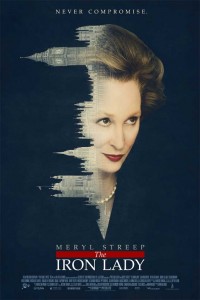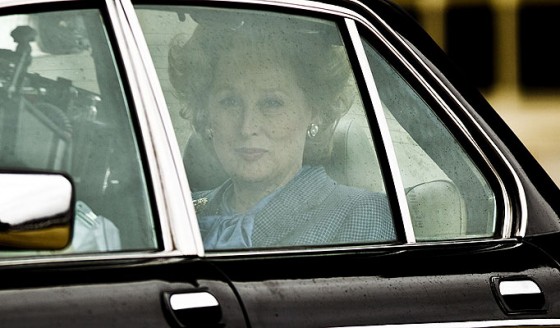
Directed by Phyllida Lloyd
Written by Abi Morgan
UK / France, 2012
Margaret Thatcher was one of the most reviled figures in British political history. A globally recognized woman, she was Britain’s first and only (to date) female prime minister and had the longest term of office of any UK politician in the 20th century. As prime minister, she served and stirred up a lot of anger during the most volatile political era of the 20th century outside the two world wars. The Falklands war, the IRA and the ostensibly unending conflicts with the miners & trade unions provide more than enough material for a number of biopics to be made. Of all the directors to front such a project we have Phyllida Lloyd, the director of the immensely successful musical Mamma Mia.
Refusing to focus on one event, writer Abi Morgan (who also co-wrote Shame) decides to briefly touch upon them all under the framing device of an elderly Thatcher suffering from dementia reminiscing about her past. Covering all periods of her life, from the days when she was Margaret Roberts, the daughter of a conservative speaker and small business owner, meeting her husband Dennis Thatcher, and raising her children, the aforementioned political episodes as the sole woman in a man’s world, all within the framing device of an elderly woman suffering from dementia and being haunted by the memory of her long dead husband.
There lies the great problem, the lack of context. It could be debated that this is a by-product of the film’s statement on dementia. and that argument might hold weight if the direction wasn’t this chaotic. Jumping between points in Thatcher’s history with a visual point of reference that could be likened to an expressionist director’s interpretation of the fragility of the mind, only from a director with nothing like the skill or deftness of touch to make it work. Instead it’s from a director who takes something simple and more meaningful than the career of any politician and over complicates it with nauseating use of the camera, muddled editing and a lack of focus. This central arc strand emphases Thatcher’s dementia, which progresses in broad, regularly travelled lines to its predictable and hopelessly manipulative end.
When the film reminisces over past events, it feels like little thought was put in, jumping as it does from era to era using montage after montage, backed up by the use of music that defined the time, and shots of people running besides Thatcher’s car, screaming profanities at her. Such a slapdash approach skims over some of the most important political and social trials of the past 40 years and shows a blatant disregard for the woman whose life is being represented. This lack of context all but removes any drama from the film, making it hard to care. Take a moment where a room a hotel room is bombed with Margaret and Dennis in it, instead of shocking the audience it becomes the first unintentional belly laugh of the year.
The dialogue is equally poor; there aren’t any exchanges between characters of any worth. The only words that come from Thatcher are sprawling monologues that don’t add depth; instead it feels like the screenwriter is constructing Thatcher as a one-dimensional character rather than one of the most divisive charismatic people in British politics.
On top of all these problems from the borderline ignorant to the hilariously misjudged is the real reason that The Iron Lady is getting any real attention and that is the central performance from Meryl Streep. The central performance is very important. as everybody else is notable only by how little they feature, Jim Broadbent plays an occasionally wheeled-out buffoon and Olivia Colman, who put in a sublime performance in Tyrannosaur, appears with a comedy lisp and nose that wouldn’t have been out of place in one of her TV roles. This leaves it to Streep to be the singular saving grace. Streep turns in another Oscar-worthy performance, disappearing into her role with the sort of beautiful nuance she is loved for. Not only does she nail the voice and presence, she also carries herself with class and demeanor. If that wasn’t enough, she is one of the few actors who can act older than their years without chewing up scenery with their over-acting. Whenever Streep brings her A-game, it makes everybody else seem worse in contrast.
No matter how good Meryl Streep is, it takes more than her performance to make the movie. The Iron Lady is a transparently worthy film and attempt to court awards glory. With its hectic script, political insensitivity and a comical lack of context, this depiction of The Iron Lady is as deeply nuanced as you would expect from the director of Mamma Mia.
Robert Simpson



